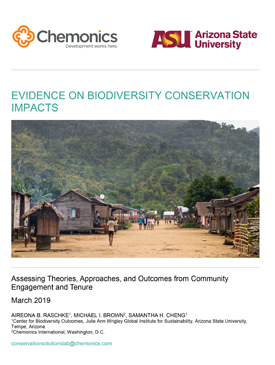
Evidence on Biodiversity Conservation Impacts: Assessing Theories, Approaches, and Outcomes from Community Engagement and Tenure .
Paper | March 31, 2019

This paper uses systematic synthesis methods to assess the state of the peer-reviewed evidence base on community engagement interventions linked to terrestrial conservation projects. Specifically, it examines the relationships between different engagement approaches and land tenure/governance structures.
This review was undertaken as part of a joint initiative, the Conservation Solutions Lab, between Arizona State University and Chemonics, and seeks to build knowledge and evidence-based approaches for more effective community engagement in conservation. The analysis revealed that the current evidence base is lacking the robust data needed to uncover the links between governance context, strategic interventions, and outcomes. This assessment does show, however, a significant lack of coherence in the characterization of community engagement approaches, which impedes robust evaluation of utility and impact. Although there is a widely held assumption within the biodiversity conservation field that engaging communities in interventions can improve environmental outcomes and human well-being, analysis shows that there is insufficient data to show when and how this might be effectively applied. Overall, community participation has been limited, and tenure is marginally considered, with consultation and benefit sharing being the most common methods of increasing community support for conservation efforts.
